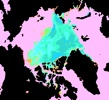 The Economist uses the climate protest at London’s Heathrow airport as a peg upon which to hang an overview of the difficult carbon prospects for the international aviation industry. An emissions trading scheme is being drawn up under the wing of the UN, and the European Commission plans to make carbon trading compulsory for all EC carriers in 2011. The Economist is admirably straightforward in its judgement:
The Economist uses the climate protest at London’s Heathrow airport as a peg upon which to hang an overview of the difficult carbon prospects for the international aviation industry. An emissions trading scheme is being drawn up under the wing of the UN, and the European Commission plans to make carbon trading compulsory for all EC carriers in 2011. The Economist is admirably straightforward in its judgement:
The introduction of carbon-trading is a welcome step by governments that are not yet willing to consider a carbon tax. The air-travel industry should have to stump up for the pollution it causes. And anyone priced out of a cheap holiday in Spain might like to consider a week-long camping break near Heathrow.
Good job they didn’t mention long haul holidays…




